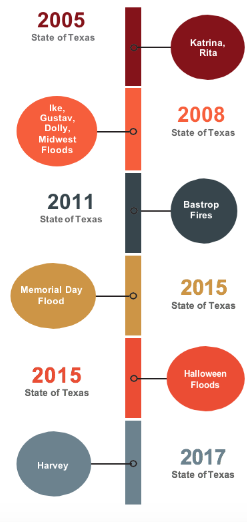Texas has moved into hurricane season as of June 1st. Texas is also a mecca of a mix of natural disasters such as fires, flash flooding, tornadoes, hail, and damaging winds. Texas Insight wants to help you get ready and start thinking about emergency preparedness from a healthcare perspective.
Stay in Compliance with Federal Regulations!
It is common knowledge that preparation is key to mitigating and responding to expected and unexpected risks. How can healthcare organizations maintain preparedness and profitability amid the complex environment of risks and regulations? Preparing in advance for disasters and emergencies is a wise and necessary investment for stability and sustainably. Ignoring these challenges until a disaster occurs may have long-term financial effects on your organization.
 Healthcare organizations face numerous challenges, including rising costs, talent shortages, increased patient volume, and more. Additionally, they must deal with an increasingly complex set of challenges to prepare for disasters and emergencies. For example, over the past three years, healthcare organizations and emergency management officials have been called to assist with not only the planning and response to contagion events such as the outbreak of the Avian Influenza, Ebola, and Zika viruses, but they also were required to assist with natural disasters like the recent 2017 Hurricane season, during which three Category-4 storms hit U.S. shores.
Healthcare organizations face numerous challenges, including rising costs, talent shortages, increased patient volume, and more. Additionally, they must deal with an increasingly complex set of challenges to prepare for disasters and emergencies. For example, over the past three years, healthcare organizations and emergency management officials have been called to assist with not only the planning and response to contagion events such as the outbreak of the Avian Influenza, Ebola, and Zika viruses, but they also were required to assist with natural disasters like the recent 2017 Hurricane season, during which three Category-4 storms hit U.S. shores.
With the increased frequency of natural disasters and other unexpected events, new emergency preparedness regulations imposed on the healthcare community have increased as well. For instance, the Emergency Preparedness Requirements for Medicare and Medicaid Participating Providers and Suppliers is a new regulation mandating that all 17 Medicare and Medicaid provider and supplier types must follow the imposed emergency preparedness regulations or risk being ineligible to participate in the programs. Those affected by this rule had to come into compliance and implement all regulations one year after the effective date, on November 15, 2017.
What are the impacts? Providers and suppliers must be in compliance with Emergency Preparedness regulations to participate in the Medicare or Medicaid program. Each provider and supplier will have its own set of Emergency Preparedness regulations incorporated into its set of conditions or requirements for certification.
How to get in compliance? The Emergency Preparedness Requirements for Medicare and Medicaid Participating Providers and Suppliers regulation outlines four core elements which are applicable to all 17 provider types, with a degree of variation based on inpatient versus outpatient, long-term care versus non-long-term care.
-
Risk Assessment and Planning
- Perform risk assessment using an “All-Hazards” approach, focusing on capacities and capabilities

- Develop an emergency operations plan based on risk assessments
- Update emergency operations plan at least annually
-
Policies and Procedure
- Develop and implement policies and procedures based on the emergency plan and risk assessment
- Must address a range of issues subsistence needs, evacuation plans, procedures for sheltering in place, tracking patients and staff during an emergency
- Review and update annually
-
Communications Plan
- Develop a communication plan that complies with both Federal and State laws
- Coordinate with the Whole Community- patient care within the facility, across health care providers, state and local public health departments and emergency management systems
- Review and update plan annually
-
Training and Exercise Program
- Develop and maintain training and exercise programs, including training in policies and procedures
- Demonstrate knowledge of emergency procedures and provide training at least annually
- Conduct drills and exercise to test the emergency operations plan
More information on emergency preparedness related to this rule can be found by visiting the Center for Medicare and Medicaid Services (CMS) – Emergency Preparedness for Every Emergency – https://www.cms.gov/Medicare/Provider-Enrollment-and-Certification/SurveyCertEmergPrep/index.html
CohnReznick LLP is an accounting, tax, and advisory firm in the U.S. with a proven history of successfully executing large-scale disaster recovery programs. To mitigate the impact of disasters before they strike, CohnReznick provides services including Continuity of Operations Planning, Threat and Hazard Identification and Risk Assessment (THIRA), Hazard Mitigation Planning and Implementation, Emergency Operations Planning, and more. To learn more, follow this link, go to www.cohnreznick.com or contact: Eddie Velez, Senior Manager, Government and Public Sector Advisory, eddie.velez@cohnreznick.com or 512-822-7939

